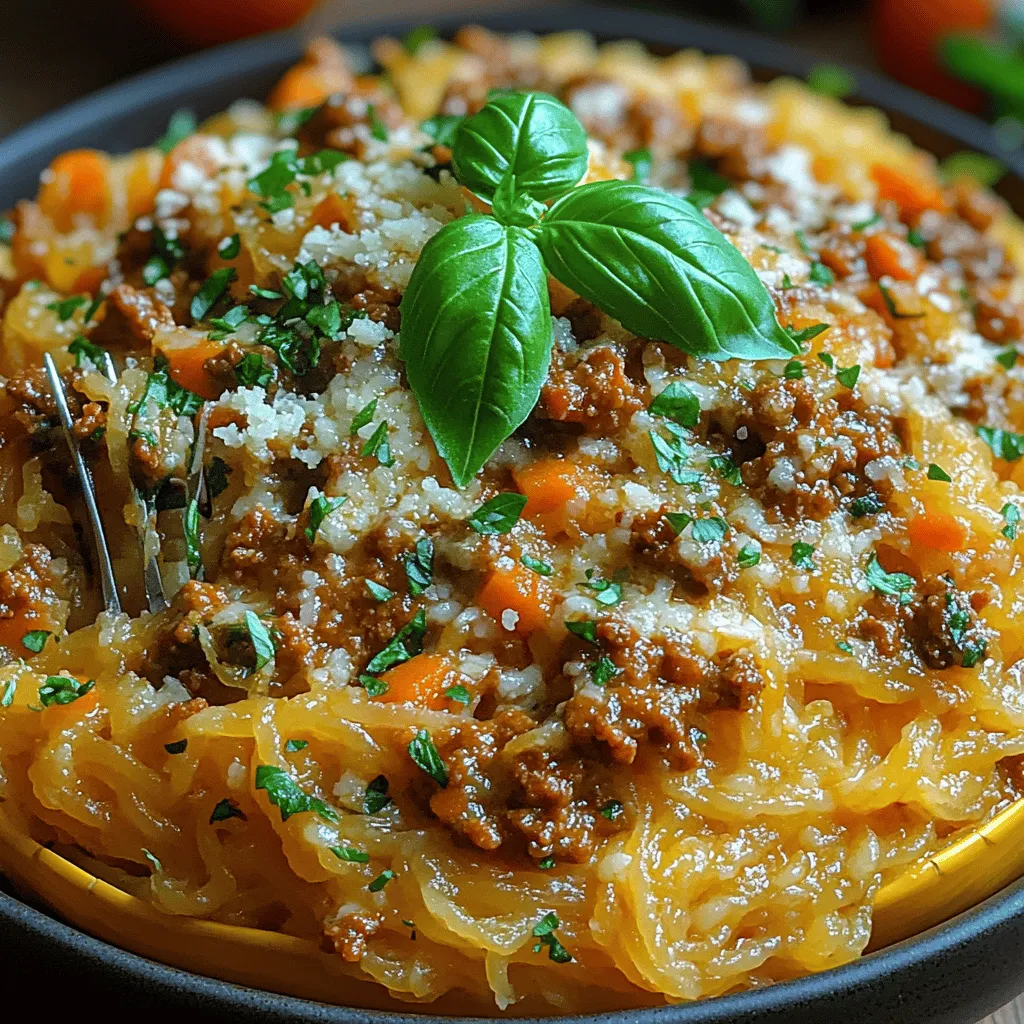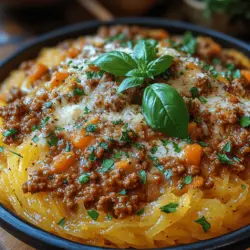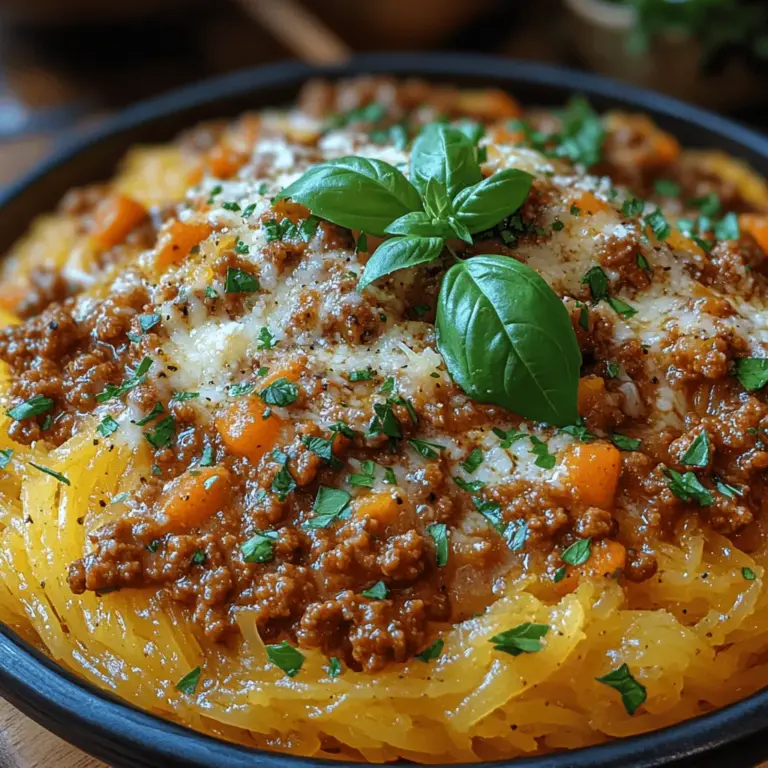Introduction
In recent years, spaghetti squash has emerged as a favorite among health enthusiasts and culinary explorers alike. This unique vegetable, often touted as a low-carb alternative to traditional pasta, offers a delightful texture and a subtle flavor that pairs well with various sauces. When combined with lean ground turkey in a robust Bolognese sauce, spaghetti squash transforms into a nutritious and satisfying dish that satisfies cravings without compromising your health goals.
The recipe for Spaghetti Squash with Turkey Bolognese is not only a delicious alternative but also a smart way to incorporate more vegetables into your diet. This dish is perfect for those looking to reduce their carbohydrate intake while still enjoying the comforting essence of a hearty pasta meal. As we dive into the world of spaghetti squash and turkey Bolognese, you’ll discover how easy it is to create a meal that’s both nourishing and indulgent.
Understanding Spaghetti Squash
Spaghetti squash, scientifically known as *Cucurbita pepo*, is a type of winter squash that, when cooked, separates into strands that resemble spaghetti. This versatile vegetable is not only visually appealing but also packed with nutrients. A one-cup serving of cooked spaghetti squash contains approximately 42 calories, 10 grams of carbohydrates, and 2 grams of fiber, making it a very low-calorie food option.
Incorporating spaghetti squash into your diet comes with a myriad of health benefits. It is an excellent source of vitamins A and C, both of which are vital for maintaining healthy skin and a robust immune system. Additionally, the fiber content in spaghetti squash aids digestion and helps keep you feeling full longer, making it a great choice for weight management.
When compared to traditional pasta, spaghetti squash stands out as an exceptional alternative. While a cup of cooked spaghetti pasta contains around 200 calories and 42 grams of carbohydrates, spaghetti squash provides a fraction of those calories and carbs. This stark contrast makes spaghetti squash a fantastic choice for those looking to lower their carbohydrate intake without sacrificing the enjoyment of a pasta dish.
The Appeal of Turkey Bolognese
Ground turkey is increasingly recognized as a lean protein source that can easily replace higher-fat meats in various recipes. Not only is turkey lower in calories and saturated fat compared to beef or pork, but it is also rich in essential nutrients, including protein, niacin, vitamin B6, and selenium. These nutritional benefits make turkey a smart choice for creating hearty meals that support your health.
The traditional Bolognese sauce, originating from Bologna, Italy, is typically made with ground beef, pork, or a combination of both, simmered with tomatoes, wine, and aromatics for a rich and flavorful experience. However, by substituting ground turkey for the traditional meats, this recipe offers a modern twist that retains the comforting essence of Bolognese while reducing fat and calorie content.
Using turkey in your Bolognese not only lightens the dish but also allows for a fresh take on a classic. The sauce remains robust and satisfying, thanks to the combination of herbs, vegetables, and the natural flavors of the turkey, making it an appealing option for both health-conscious individuals and families seeking delicious meals.
Ingredients Breakdown
Creating Spaghetti Squash with Turkey Bolognese requires a variety of fresh ingredients that come together to form a flavorful and well-balanced meal. Here’s a detailed breakdown of what you will need:
Ingredients for Spaghetti Squash
– 1 medium spaghetti squash: The star of the dish, providing the base and texture.
– Olive oil: Used for drizzling over the squash before roasting to enhance flavor and promote browning.
– Salt and pepper: Essential seasonings to enhance the natural taste of the squash.
Ingredients for Turkey Bolognese
– 1 pound ground turkey: The main protein source, offering a lean and flavorful base for the sauce.
– 1 medium onion, diced: Adds sweetness and depth to the sauce.
– 2 cloves garlic, minced: Provides aromatic and savory notes.
– 2 carrots, diced: Adds sweetness and a hint of earthiness.
– 2 celery stalks, diced: Contributes crunch and additional flavor.
– 1 can (14.5 oz) crushed tomatoes: Forms the body of the sauce, providing acidity and richness.
– 1 tablespoon tomato paste: Intensifies the tomato flavor and creates a thicker sauce.
– 1 teaspoon dried oregano: Adds a classic Italian flavor profile.
– 1 teaspoon dried basil: Enhances the overall taste with its sweet and fragrant notes.
– 1/2 teaspoon red pepper flakes (optional): Adds a hint of heat for those who enjoy a little spice.
– Salt and pepper to taste: Essential for bringing all the flavors together.
– Fresh basil for garnish: Provides a pop of color and freshness when serving.
Optional Ingredients
Feel free to customize the Bolognese with additional ingredients to enhance flavor and nutrition. Some popular options include:
– Mushrooms: Add diced mushrooms for an earthy flavor and extra texture.
– Zucchini: Grated or diced zucchini can increase the vegetable content and add moisture.
– Spinach: Stir in fresh spinach towards the end of cooking for added nutrients and color.
Using fresh, high-quality ingredients is crucial in elevating the flavors of this dish. The combination of vegetables in the Bolognese not only adds depth but also ensures that you are getting a variety of nutrients in one meal.
Step-by-Step Instructions
Now that you have an understanding of the ingredients and their benefits, let’s start preparing this delicious Spaghetti Squash with Turkey Bolognese. The first step is crucial for achieving perfectly roasted spaghetti squash.
Preheating the Oven
Preheat your oven to 400°F (200°C). This temperature is ideal for roasting the spaghetti squash, allowing it to caramelize and develop a rich flavor. Proper preheating ensures that the squash cooks evenly, resulting in tender strands that you can easily scrape out with a fork once cooked.
Preparing the Spaghetti Squash
1. Cut the squash: Carefully slice the spaghetti squash in half lengthwise using a sharp knife. This can be a bit challenging due to the squash’s tough exterior, so take your time and use a stable cutting board.
2. Remove the seeds: Using a spoon, scoop out the seeds and stringy pulp from the center of each half. Discard the seeds or save them for roasting later.
3. Season the squash: Drizzle the cut sides of the squash with olive oil, then sprinkle with salt and pepper. Rub the oil and seasonings into the flesh to ensure even coverage.
4. Roast the squash: Place the squash halves cut side down on a baking sheet lined with parchment paper. Roast in the preheated oven for about 30-40 minutes, or until the flesh is tender and easily pierced with a fork.
While the spaghetti squash is roasting, you can begin preparing the Turkey Bolognese sauce, which will be the perfect complement to this nutritious base.
Stay tuned as we continue with the step-by-step instructions for creating the flavorful Turkey Bolognese sauce that will transform your spaghetti squash into a satisfying meal!

Preparing the Spaghetti Squash: Techniques for Cutting and Roasting
To get started with your spaghetti squash, the first challenge is cutting it. Due to its tough exterior, it’s essential to use a sharp knife and to be cautious while cutting. Here’s how to do it effectively:
1. Stabilize the Squash: Place the spaghetti squash on a stable cutting board. If it’s rolling, you can cut a small slice off the bottom to create a flat surface.
2. Cutting: Carefully slice the squash lengthwise down the center. Depending on the size, you may need to apply some pressure, but be mindful of your fingers.
3. Scoop Out the Seeds: Once halved, use a spoon to scoop out the seeds and stringy bits from the center. This step is crucial for achieving the perfect texture later.
4. Roasting: Preheat your oven to 400°F (200°C). Drizzle the insides of the squash with olive oil and sprinkle with salt and pepper. Place the halves cut-side down on a baking sheet lined with parchment paper. Roast for about 30-40 minutes, or until the flesh is tender and easily pierced with a fork.
5. Scraping: After roasting, allow the squash to cool slightly before using a fork to scrape the flesh into long strands that resemble spaghetti.
Tips for Selecting the Perfect Squash
When choosing a spaghetti squash, look for the following characteristics for optimal flavor and texture:
– Weight: The best spaghetti squashes are heavy for their size, indicating a high moisture content.
– Skin: Choose squashes with a firm, smooth skin that is free from blemishes or soft spots. A dull yellow color is preferable over a shiny one, as this indicates ripeness.
– Shape: A more rounded shape typically indicates more flesh, while a long, narrow squash might have more seeds and less meat.
Making the Turkey Bolognese: Step-by-Step Cooking Process
Now that your spaghetti squash is prepared, it’s time to focus on the turkey Bolognese sauce. This step requires a bit of patience, as building flavor is crucial.
1. Sautéing the Vegetables: In a large skillet, heat 2 tablespoons of olive oil over medium heat. Add a diced onion, 2 minced garlic cloves, and a finely chopped carrot. Sauté for about 5-7 minutes until the vegetables are soft and fragrant. This step is essential as it lays the foundation for the sauce’s depth of flavor.
2. Adding Ground Turkey: Increase the heat to medium-high and add 1 pound of ground turkey to the skillet. Use a wooden spoon to break it up. Cook for about 6-8 minutes or until browned, ensuring it’s fully cooked through. Properly browning the turkey not only improves the texture but also adds a rich flavor to the sauce.
3. Incorporating Tomatoes and Herbs: Once the turkey is cooked, stir in a 14-ounce can of crushed tomatoes, 1 tablespoon of tomato paste, and a splash of chicken or vegetable broth for added moisture. Season with salt, pepper, a teaspoon of dried oregano, and a pinch of red pepper flakes for heat. Allow the sauce to simmer for at least 20-30 minutes on low heat. This simmering time helps the flavors meld beautifully.
4. Final Touches: Near the end of cooking, taste the sauce and adjust the seasoning as needed. You can add fresh basil or parsley for an aromatic finish.
Combining the Sauce and Squash: How to Achieve the Right Consistency and Flavor Balance
Once both the spaghetti squash and turkey Bolognese are ready, it’s time to combine them. Here’s how to achieve the best results:
1. Mixing: In a large bowl, combine the spaghetti squash strands with the turkey Bolognese sauce. Gently toss until the squash is well coated. If the mixture seems too dry, consider adding a bit more broth or a splash of olive oil to enhance moisture.
2. Texture Balance: Aim for a consistency that allows the squash to retain its shape while being enveloped in the sauce. Adjust the amount of sauce based on your preference—some like it saucier while others prefer a more noodle-like experience.
Serving Suggestions and Presentation Ideas to Enhance the Dining Experience
When it comes to serving your spaghetti squash with turkey Bolognese, presentation can elevate the meal. Here are a few ideas:
– Garnish: Top each serving with freshly grated Parmesan cheese or a sprinkle of nutritional yeast for a dairy-free option. Fresh basil or parsley can also add a pop of color and freshness.
– Plating: Serve the dish in hollowed-out squash halves for a rustic touch, or use large, shallow bowls to showcase the vibrant colors of the sauce and squash.
– Accompaniments: Pair the dish with a side salad dressed in a light vinaigrette or some crusty whole-grain bread to complete the meal.
Nutritional Information
Understanding the nutritional content of your dish can help you appreciate its health benefits. Here’s a breakdown per serving (approximately):
– Calories: 350
– Protein: 30g
– Fat: 15g
– Carbohydrates: 20g
Health Benefits of Ingredients:
– Spaghetti Squash: Low in calories and carbohydrates, it’s an excellent source of vitamins A and C, fiber, and potassium.
– Ground Turkey: A lean protein option that’s lower in fat compared to traditional beef, providing essential nutrients like iron and zinc.
– Tomatoes: Rich in antioxidants such as lycopene, which has been linked to numerous health benefits including heart health.
Comparison with Traditional Spaghetti Bolognese:
Traditional spaghetti Bolognese, often made with regular pasta and a meat sauce, can be high in calories and carbohydrates. By substituting spaghetti squash for pasta, this recipe provides a lighter, low-carb alternative that retains the comforting flavors of the classic dish.
Variations and Customization
This recipe is versatile, allowing for a wide range of adaptations to suit different dietary needs and preferences:
– Alternative Proteins: Substitute ground turkey with ground chicken, beef, or even pork for a different flavor profile.
– Vegetarian or Vegan Options: For a meatless version, consider using cooked lentils or finely chopped mushrooms as a hearty base. Both options provide a savory texture that complements the sauce beautifully.
– Flavor Enhancements: For a richer sauce, consider adding a splash of red wine while cooking the turkey. Fresh herbs such as thyme or rosemary can also enhance the aroma. Feel free to experiment with different vegetables, such as bell peppers or zucchini, for added nutrition.
Storing and Reheating Leftovers
If you find yourself with leftovers, here are the best practices for storage and reheating:
– Storage: Allow the dish to cool completely before transferring it to an airtight container. Both the spaghetti squash and turkey Bolognese can be stored in the refrigerator for up to 3-4 days. For longer storage, consider freezing the Bolognese separately for up to 3 months.
– Reheating: To reheat, place the leftovers in a skillet over low heat, adding a splash of broth or water to maintain moisture. Stir occasionally until heated through. If reheating in the microwave, cover the dish to trap steam and heat in short intervals, stirring in between.
Conclusion
Making spaghetti squash with turkey Bolognese is not only a delightful culinary experience but also a health-conscious choice. This recipe showcases how simple ingredient swaps can lead to a nutritious meal without sacrificing flavor. Not only does it offer a satisfying alternative to traditional pasta, but it also encourages integrating more wholesome ingredients into everyday cooking.
With its rich flavors and comforting textures, this dish is perfect for weeknight dinners or meal prep. So why not try this healthy option today and enjoy the benefits of delicious, nutritious eating? Embrace the versatility of spaghetti squash and turkey Bolognese, and let your creativity shine in the kitchen.


